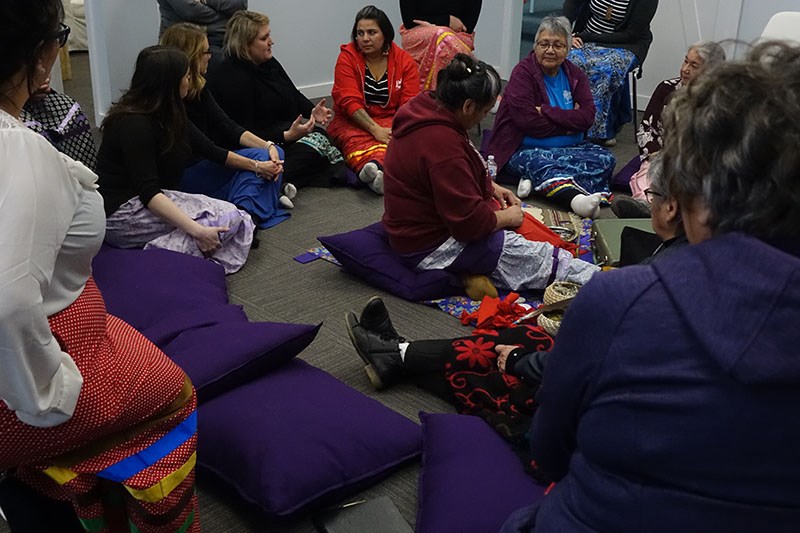A pipe ceremony at Manitoba Keewatinowi Okimakanak’s (MKO) office in Thompson was held Nov. 25 to launch the third phase of a five-year research project that is seeking to hear the experiences of Indigenous, remote and northern people affected by domestic violence.
The Canadian Domestic Homicide Prevention Initiative is funded by the Social Sciences Humanities Research Council (SSHRC) and seeks to conduct research on domestic violence homicides in Canada in an effort to identify strategies to reduce the risk of being a victim and sharing this knowledge with communities that are particularly vulnerable to domestic homicide, including Indigenous people, immigrants and refugees, children exposed to domestic violence and rural, remote and northern residents.
The research in Manitoba is being led by Kendra Nixon of RESOLVE Manitoba at the University of Manitoba and conducted in partnership with MKO, Wahbung Abionoonjiiag and the Ma Mawi Wi Chi Itata Centre.
“When I was approached to participate and become a partner on this project, I shared with with our executive director and she immediately agreed that it was very important for MKO to be part of this project because far too often the voices of the north are forgotten,” said Hilda Anderson-Pyrz, MKO’s Missing and Murdered Indigenous Women and Girls (MMIWG) liaison. “I wanted to ensure that we had that opportunity to include voices from the north as well as from the children who are left behind. Sadly, many times as Indigenous people our voices are not really heard until it’s included in research. We’ve got to be advocates but also include our voices in research. We’re trying to do both in this program.”
Nixon said having the cooperation of the partner organizations helps researchers to gather the information they need while also being respectful of the trauma participants have experienced.
“This project will open up a lot of hurtful memories but it’s important that we honour those stories and don’t forget about people that have been impacted,” said Nixon. “We will take care of those stories as sacred stories and not simply data that researchers collect. You can’t talk about violence in this country this province without acknowledging the overrepresentation of Indigenous peoples so I hope that this is the beginning of a very good and gentle relationship that’s based on good faith, reciprocity and trust.”
MKO Grand Chief Garrison Settee and Thompson deputy mayor Les Ellsworth said they have family members who have experienced domestic violence.
“I had younger siblings that later moved to Thompson and one of them ended up having a boyfriend here in the north, actually he was from Tadoule Lake,” said Ellsworth. “It was a very violent relationship.”
“We have to teach them when it’s OK to walk away and sometimes not walk, run,” said Settee.”You run away because you’re going to be a victim of homicide if you don’t walk away.”
Angie Hutchinson of the Ma Mawi Wi Chi Itata Centre said it was important that research projects like this take the Indigenous worldview and knowledge into account.
“We may have a different form of application of rigour and different ways and that can absolutely be included within academic contexts,” she said.
Renée Hoffart of RESOLVE Manitoba is the prairie regional co-ordinator fo the CDHPI and said having Indigenous organizations as partners helps researchers work more effectively.
“Part of this work that we’ve been doing with MKO, Wahbung and Ma Mawi is really looking at how we can hear the experiences of survivors and the friends and family of people who have been murdered in a way that is safe and supportive and honouring those stories,” she said. “It would not be possible to what we’re doing in that way without them.”
The CDHPI is seeking survivors of severe domestic violence and family and friends of victims of domestic homicides to share their stories in one- to two-hour interviews by phone, video conference or in person. There is no payment for participating but interview subjects will receive a $50 gift card as a thank-you and the researchers will work with them to protect their privacy and safety. For more information or to participate, contact Hoffart at 204-474-7410, 1-844-958-0522 or email her at renee.hoffart@umanitoba.ca.
“I’m really looking forward to how the data is going to be used and then also really hopeful that it’s going to be used to influence change especially given the recent statistics for Northern Manitoba,” said Anderson-Pyrz.




